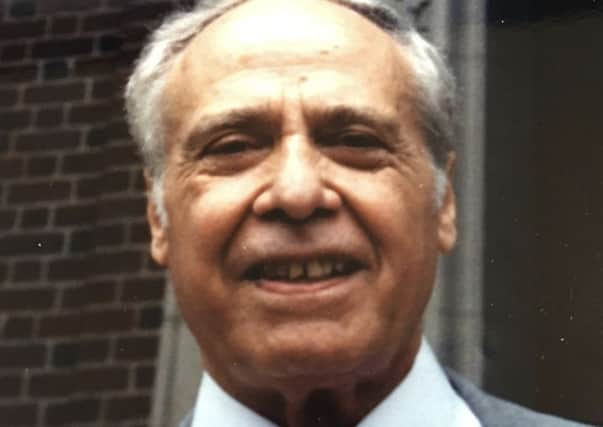Obituary: Pierre Cachia, Professor of Arabic fashioned modern studies


Pierre Cachia was instrumental in fashioning academic studies of modern Arabic literature into what it is today.
His love of both classical and modern Arabic literature stretched back to his childhood when, as a boy growing up in Egypt, he had been surrounded by the culture and language. Post-war, he would emerge as an influential teacher and mentor, enjoying a career spanning 60 years, much of it spent at the University of Edinburgh.
Advertisement
Hide AdAdvertisement
Hide AdSo passionate was he about his subject that he finally retired just a couple of years ago, at the age of 92, returning to Scotland from New York where he had held the chair of Arabic Language and Literature at Columbia University.
The son of a Russian mother, who had made her way to Egypt via Jerusalem as a young girl, and a bank manager father of Maltese descent, he was born in Fayyum and raised in Upper Egypt. After an education at various French, Italian, Egyptian and American schools, he studied at The American University in Cairo and graduated with a BA degree.
Called up in Egypt in 1943, he, like his mother, was a censor during the Second World War. Though conscripted as a British subject, he could have avoided serving in the forces but opted not to seek an exemption. His mother also declined the offer of a desk job for her son who served with the army’s 78th Division as an interpreter but was often posted out to work with other units, including the 8th Army.
He served in Tunisia, Libya, Malta, Sicily, Italy and Austria. Whilst in Sicily he was posted to 281 Field Park Company, Royal Engineers, and promoted to sergeant. It was the company’s esprit de corps and friendships he forged then that later played a part in his emigration to Scotland.
Immediately after the war ended, he returned to Cairo’s American University, where he taught from 1946-49 before heading for Scotland. He studied for his PhD, receiving his doctorate at the University of Edinburgh in 1951 and subsequently taught there for the next 24 years, becoming a senior lecturer in Arabic.
At the time fellow Arabists were concentrating on the study of classical Islam and few were interested, he maintained, in “what the contemporary Arab thought or wrote”. But by 1956 he had written the first English language book to seriously study any aspect of modern Arabic literature, Taha Husayn: His place in the Egyptian Literary Renaissance, probably his most important work. Other publications during that period included his 1973 volume The Monitor: a Dictionary of Arabic Grammatical Terms. By 1975 he had moved to New York, to the private Ivy League institution Colombia University, where he was appointed Professor of Arabic Language and Literature and where he remained an influential and highly-regarded teacher and mentor. He taught both pre-modern Arabic literature and modern folk Arabic literature and retired in 1991 although he remained in Manhattan and continued to teach and write, producing academic articles and books on various subjects and translating classical and modern literary critical work.
In addition to titles such as Popular Narrative Ballads of Modern Egypt (1989), An Overview of Modern Arabic Literature (1990) and numerous essays compiled in Exploring Arab Folk Literature (2011), he also published the work of other academics in the Journal of Arabic Literature, a publication he co-founded and jointly edited for many years. He had also spent a year at the Woodrow Wilson International Center for Scholars in Washington and sat on a panel of experts on Arabic at the University of London.
As one former student Wen-Chin Ouyang observed, he represented “an irretrievable era in which a first generation of post-war American and European Arabists and Orientalists made tremendous strides in fashioning academic studies of modern Arabic literature into what it is today: grounded in native fluency of the Arabic language, informed by real experiences lived in close proximity with Arab writers and storytellers, and took seriously the concerns and priorities of Arab scholars, critic and intellectuals.”
Advertisement
Hide AdAdvertisement
Hide AdRemembered as a gentleman scholar and raconteur, with perfect command of both English and Arabic, he always put his students first and spent his life striving to write concisely and eloquently for their benefit. He was also admired for his generosity of spirit, continuing to share his knowledge and understanding of his subject internationally for many decades.
Following his death, his family launched a fundraising campaign in his memory to honour his legacy and support research into Arabic language and literature.
Divorced from his first wife, he was pre-deceased by his second wife, Merle, and is survived by his children Susan, Philip and Helen and extended family.
ALISON SHAW